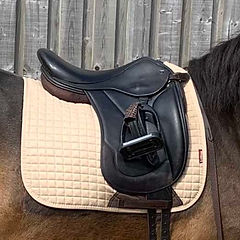
Tack & Accessories
to compliment your NRD saddle
Girths
Finding the right one for your needs
Girths: they're kind of a big deal!
As the thing that attaches your saddle to your horse, it's important to identify the right one.
At NRD saddles we put a lot of time, effort and research into the positioning of the actual girth straps on the tree. Therefor when you buy a saddle bespoke from us we can garantee that your straps will be in the correct place for your horses point of girth.
A lot of saddles will slide when the straps are in the wrong position, as the girth will naturally find its way into the horses armpit, taking the saddle with it!

Girths

Stubben Short Girth
Wide, supportive bearing surface. Very little stretch. Good backing behind the buckles with generous surround to prevent elbow contact. These rarely chaff and are easy to clean. The Stubben neoprene girths offer unparalleled grip and security.

Stubben Cord String girth
Made from thick, soft nylon cords which all run parallel to form a self shaping broad bearing surface. These girths are fantastic and they always fit to form perfectly as each cord has its own tension. They offer excellent grip on rounder body types and rarely chaff because the horses body stays much drier because of better airflow through the cords. Very little stretch. Smoothly bound sides to protect skin. Roller buckles for smooth girthing. The string girths do need to be washed carefully in tepid water and you can also buy protective sleeves to use in conjunction with this girth.

Anatomical girths
We don't yet have a picture because we don't use one!
Speaking from our perspective - Anatomical girths may not be the greatest to use with our saddles as the often exaggerated shape of the girth will end up pulling the girth straps in the wrong direction, causing the saddle to move and also causing uneven pressure most commonly along the back of the girth into the horses sternum.
Always run you hand under your chosen girth to check for uneven pressure along the from and back, any gaping on one side means all the pressure is running through a smaller surface area.
Saddle pads and Numnahs
The saddle should fit the horse - not the numnah!
The padding you have in-between the horse and the saddle massively influences saddle fit and thus good attention needs to be paid to saddle pad thickness, material and shape.

Saddle Pads and Numnahs

Simple Numnah
A thin breathable cotton numnah is all you will need for a correctly fitting saddle. Shaped to fit the saddle, square or euro fit - anything goes! Just ensure there is adequate wither clearance by pulling the numnah up into the gullet of the saddle before girthing.

Sheepskin Lined
Natural sheepskin is an excellent option for horses who may have dropped off over the winter or for horse with atrophy coming back into work who will be gaining topline.
Always make sure the sheepskin covers the entirety of the panel, from and back, and there are no hard edges.

Sheepskin rolls
If using a numnah with decorative rolls or binding always make sure the saddle does not come into contact with either of the above!
At best they will cause expensive damage to your saddle and at worst expensive damage to your horse!

Felt half pad
Ideal for a horse in-between fits after time off work, the felt is naturally breathable and sweat wicking.
Felt pads are generally available in two different thicknesses and can be used alternatively depending on the horses needs at the time.
We always recommend that you use an entire felt pad over shims when needing to temporarily alter the fit of a saddle with out adjusting the tree.
.png)


